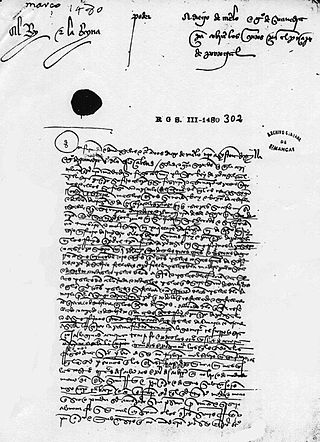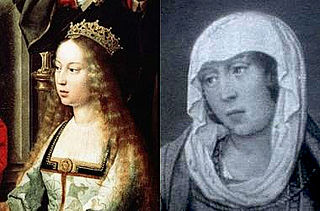
Afonso IV, called the Brave, was King of Portugal from 1325 until his death in 1357. He was the only legitimate son of King Denis of Portugal and Elizabeth of Aragon.

Denis, called the Farmer King and the Poet King, was King of Portugal. The eldest son of Afonso III of Portugal by his second wife, Beatrice of Castile, and grandson of Afonso II of Portugal, Denis succeeded his father in 1279. His marriage to Elizabeth of Aragon, who was later canonised as a saint of the Roman Catholic Church, was arranged in 1281 when she was 10 years old.

The Treaty of Alcáçovas was signed on 4 September 1479 between the Catholic Monarchs of Castile and Aragon on one side and Afonso V and his son, Prince John of Portugal, on the other side. It put an end to the War of the Castilian Succession, which ended with a victory of the Castilians on land and a Portuguese victory on the sea. The four peace treaties signed at Alcáçovas reflected that outcome: Isabella was recognized as Queen of Castile while Portugal reached hegemony in the Atlantic Ocean.

Afonso, Hereditary Prince of Portugal was the heir apparent to the throne of Portugal. He was born in Lisbon, Portugal, and died in a horse-riding accident on the banks of the river Tagus.

The Portuguese conquest of Ceuta took place on 21 August 1415, between Portuguese forces under the command of King John I of Portugal and the Marinid sultanate of Morocco at the city of Ceuta. The city's defenses fell under Portuguese control after a carefully prepared attack, and the successful capture of the city marked the beginning of the Portuguese Empire.

Abu Al-Hasan 'Ali ibn 'Othman, was a sultan of the Marinid dynasty who reigned in Morocco between 1331 and 1348. In 1333 he captured Gibraltar from the Castilians, although a later attempt to take Tarifa in 1339 ended in fiasco. In North Africa he extended his rule over Tlemcen and Hafsid Ifriqiya, which together covered the north of what is now Algeria and Tunisia. Under him the Marinid realms in the Maghreb briefly covered an area that rivalled that of the preceding Almohad Caliphate. However, he was forced to retreat due to a revolt of the Arab tribes, was shipwrecked, and lost many of his supporters. His son Abu Inan Faris seized power in Fez. Abu Al-Hasan died in exile in the High Atlas mountains.

Isabella, Princess of Asturias was the eldest daughter and heir presumptive of King Ferdinand II of Aragon and Queen Isabella I of Castile. She was Queen of Portugal as the wife of King Manuel I from 30 September 1497 until her death the following year.

Beatrice of Castile or Beatriz was an infanta of Castile, daughter of Sancho IV and María de Molina. She was Queen of Portugal from the accession of her husband, Afonso IV, in 1325 until his death on 28 May 1357.

Fernando (or Fernán) Sánchez de Tovar, 1st Lord of Belves was a Castilian soldier and Admiral of the Middle Ages.

The War of the Castilian Succession was the military conflict contested from 1475 to 1479 for the succession of the Crown of Castile fought between the supporters of Joanna 'la Beltraneja', reputed daughter of the late monarch Henry IV of Castile, and those of Henry's half-sister, Isabella, who was ultimately successful.
Gonçalo (Gonçalves) Pereira (c.1280–1348) was a Portuguese prelate of the Catholic Church who served as the archbishop of Braga from 1326 until 1349.

Portuguese maritime exploration resulted in the numerous territories and maritime routes recorded by the Portuguese as a result of their intensive maritime journeys during the 15th and 16th centuries. Portuguese sailors were at the vanguard of European exploration, chronicling and mapping the coasts of Africa and Asia, then known as the East Indies, and Canada and Brazil, in what came to be known as the Age of Discovery.

Pedro Afonso, Count of Barcelos, was an illegitimate son of King Denis of Portugal and Grácia Frois. He was made the 3rd Count of Barcelos on 1 May 1314.

The conquest of the Canary Islands by the Crown of Castile took place between 1402 and 1496 and described as the first instance of European settler colonialism in Africa. It can be divided into two periods: the Conquista señorial, carried out by Castilian nobility in exchange for a covenant of allegiance to the crown, and the Conquista realenga, carried out by the Spanish crown itself, during the reign of the Catholic Monarchs.

The Battle of Guinea took place on the Gulf of Guinea, in western Africa, 1478, between a Portuguese fleet and a Castilian fleet in the context of the War of the Castilian Succession.

The Battle of Cape St Vincent of 1337 took place on 21 July 1337 between a Castilian fleet commanded by Alfonso Jofre Tenorio and a Portuguese fleet led by the Luso-Genoese admiral Emanuele Pessagno. The fledgling Portuguese fleet was defeated, bringing a quick end to the brief Luso-Castilian war that begun in 1336.
Lançarote de Freitas, better known as Lançarote de Lagos or Lançarote da Ilha, was a 15th-century Portuguese explorer and slave trader from Lagos, Portugal. He was the leader of two large Portuguese slaving raids on the West African coast in 1444–46.
The high office of Admiral of the Kingdom of Portugal as the head of the Portuguese navy was created by King Denis of Portugal in 1317 for the Genoese nobleman and naval officer Manuel Pessanha. Although there is evidence that such a title existed before, it seems to have been of only a temporary character, for fleets assembled in times of war. The exception was perhaps Nuno Fernandes Cogominho who seems to have been appointed admiral by King Denis in 1307, and still had that title at his death in 1316, although the conditions are unclear. Nonetheless, Manuel Pessanha was the first person known to hold the title of Almirante-mor as a permanent office for a permanent fleet. All the king's galleys were under his jurisdiction. The conditions of the Pessanha's title stipulated that he must maintain a corps of at least 20 Genoese naval officers at all times and was obliged to serve the king in military service on land as well as sea.

The Kingdom of Portugal was established from the county of Portugal in the 1130s, ruled by the Portuguese House of Burgundy. During most of the 12th and 13th centuries, its history is chiefly that of the gradual reconquest of territory from the various Muslim principalities (taifas) of the period.
Sir Antonio (di) Pessagno was a Genoese merchant and administrator. He is known mainly from his activities in England and France. He was the chief financier of King Edward II of England from 1312 until 1319.
















